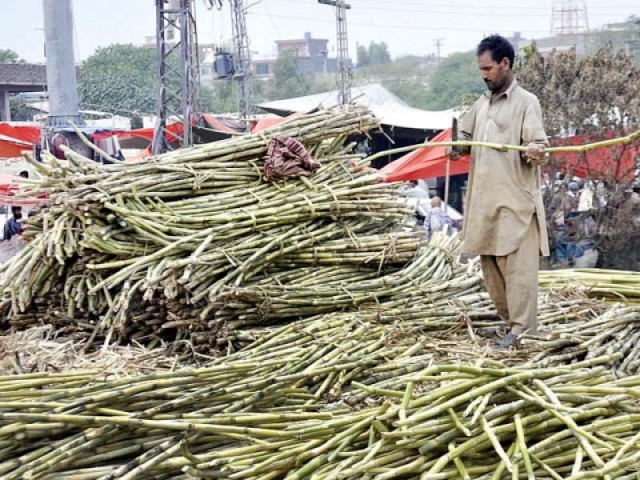Sugarcane farmers get bitter end of the deal
Govt could not ensure printing of price and quantity on sugarcane purchase receipts

The Economic Coordination Committee, in its meeting held in December last year, approved a minimum benefit of Rs15 billion for the millers through procurement of 300,000 tons of surplus sugar stock. PHOTO: INP
Now, growers have been left at the mercy of the millers, many of whom are paying far lower than the set support price for sugarcane.
The PPP government, in its 2008-13 tenure, had agreed on printing the quantity and price of sugarcane on the purchase receipt in a bid to avoid exploitation of the farmers.
K-P’s plan to set up two new sugar mills in DI Khan scuppered
The mechanism was also endorsed by different ministries and organisations including the Ministry of Finance, Ministry of National Food Security and Research, Federal Board of Revenue, State Bank of Pakistan, cane commissioners of Punjab, Khyber-Pakhtunkhwa and Sindh, and the Kisan Board.
However, according to sources, the sugar millers are now paying for less than the actual weight of sugarcane and are also offering Rs140 per 40 kg of sugarcane, which was much lower than the support price of Rs180 set by the provincial governments.
The policy adopted by the current government seems to have been more favourable for the millers in comparison to the farmers. It has doled out billions of rupees in export subsidy to the millers.
The Economic Coordination Committee (ECC) of the cabinet, in its meeting held in December last year, approved a minimum benefit of Rs15 billion for the millers through procurement of 300,000 tons of surplus sugar stock.
The total hit to the exchequer, both for the federal and provincial governments, would be at least Rs20.4 billion including the cost of subsidy on sugar exports. This was in addition to the benefit of Rs30 billion that the millers would get by claiming Rs20-per-kg subsidy on the export of 1.5 million tons.
During discussions in an ECC huddle in January last year, Minister of State for Information Technology Anusha Rahman had referred to minutes of the Sugar Advisory Board meeting held on December 19, 2016.
The board was informed that sugar prices had been consistently increased over the years despite virtually no change in sugarcane rates for the past three years.
During the PPP government’s tenure, the federal cabinet in February 2012 had decided that in order to ensure timely payments to the growers, the adviser to prime minister on law along with secretaries of finance and industries would examine the feasibility of converting the sugarcane purchase receipts into cheques in consultation with the growers.
Sindh Chamber of Agriculture fears decline in wheat production this season
Later in July 2012, it was recommended that the sugar mills should pay sugarcane growers through a cheque with an attached cane purchase receipt showing the purchase price and quantity.
It was also agreed that provincial cane commissioners would ensure the inclusion of sugarcane purchase quantity and price in the receipt. In case of any problems, they would seek assistance of the district coordination officers (DCOs).
The Pakistan Banks Association also backed the plan, saying under the mechanism where purchase receipts would be backed by cheques, the growers would have the option of recourse to legal action. Apart from this, the sugar mills would ensure that funds were available in their accounts every time they issue a cheque.
The bank would disburse the amount as per details of the cheque and subject to the availability of funds in a sugar miller’s account.
Published in The Express Tribune, January 30th, 2018.
Like Business on Facebook, follow @TribuneBiz on Twitter to stay informed and join in the conversation.




1733130350-0/Untitled-design-(76)1733130350-0-208x130.webp)













COMMENTS
Comments are moderated and generally will be posted if they are on-topic and not abusive.
For more information, please see our Comments FAQ